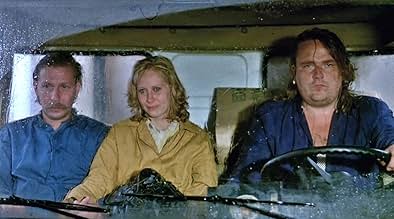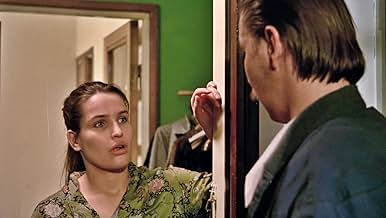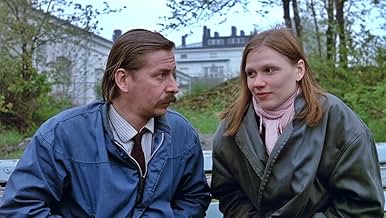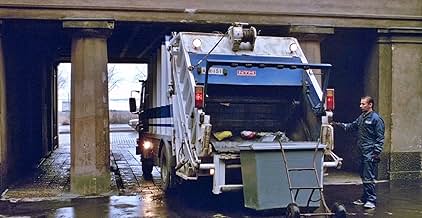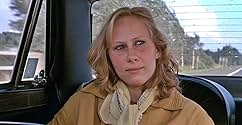AVALIAÇÃO DA IMDb
7,4/10
8,1 mil
SUA AVALIAÇÃO
Adicionar um enredo no seu idiomaAn episode in the life of Nikander, a garbage man, involving the death of a coworker, a love affair and much more.An episode in the life of Nikander, a garbage man, involving the death of a coworker, a love affair and much more.An episode in the life of Nikander, a garbage man, involving the death of a coworker, a love affair and much more.
- Prêmios
- 1 vitória no total
Safka Pekkonen
- Pianist
- (as Safka)
Mato Valtonen
- Pelle
- (as Markku Valtonen)
Sakke Järvenpää
- Staffan
- (as Sakari Järvenpää)
Avaliações em destaque
The first part of AKI's "worker" trilogy is also the first time to see his works. It basically meets the expectations. The shooting is not artificial. It completely and truly restores the face of the bottom society in Finland and the various problems that men have to face in their life. In some places, people's loneliness is well interpreted, which is worthy of the word "lonely shadow" in the title. The director himself is also very handsome. He is not an ordinary actor at first sight. He looks forward to his future works.
Some random observations:
1. Kaurismaki's "paradise" is grimy city streets, garbage, landfills, jails, flophouses, shabby apartments. Two kinds of people inhabit this Eden: either the few, the snooty, the well off – or the subverbal, poorly educated quasi-lumpen stumbling about among the aforementioned sites. The settings, both exterior and interior, belong more to the England of "The L Shaped Room" or "Billy Liar" than to the Scandinavia of travel agency brochures.
2. Kaurismaki delivers virtuoso satire founded upon the stereotypical shy, wordless Finn. But he offers more by pushing beyond stereotype to display a deep familiarity with the kind of people he shows on the screen. An American director similarly so in tune with his people might be Kevin Smith. A possible British counterpart? Maybe Ken Loach.
3. "Shadows in Paradise" is also a testament to Kaurismaki's confidence in the cinematic medium itself, in its power to tell stories using sight and sound without principal reliance on the material of theater or literature – words. We are accustomed to the many films about how XX meets XY, where the characters express feelings, establish plot, indeed, do just about everything through words. Sometimes we even get entire orations, regardless of a film's "realistic" intent. Dialogue rules everything from the quippy screenplays of Nora Ephron or Preston Sturges to the tangly Gallic word-webs of Eric Rohmer. The similarities between Ernest Borgnine and Betsy Blair in "Marty" and Matti Pellonpaa and Kati Outinen in "Shadows in Paradise" end with "Marty's" theatrical, dialogue-soaked provenance. It would be hard to transfer this film of Kaurismaki to page or stage. The story would weaken and likely die in print or any exclusively verbal form.
4. For his comedy Kaurismaki employs a delay-deadpan technique, something familiar to anyone who has seen the "punishment" sequences in Laurel and Hardy's "Tit for Tat' (1935) or who remembers the standup routines of Jackie Vernon in the 60's. Kaurismaki's comedies – and "Shadows in Paradise" is a good example – prove the technique still achieves the desired result: laughs. And like Jackie Vernon or Laurel and Hardy, Kaurismaki makes his words just another ingredient in the comedy. They are well chosen and sometimes hilarious but enjoy no special preference.
5. The movie screened the other night on TCM with the host's caution that this is an unusual sort of romantic comedy – but why the caution? And why the need for any "category" in the first place? To call this a "romantic comedy" and then warn people about its "quirky" or "offbeat"nature does it a double disservice. The warning for possible category transgression either implies that the film is deficient for disregarding certain "rules", or cautions the audience that it will be disappointed, since the movie does things it probably won't accept. But comedy, like so many things in life generally, thrives on surprise. In "Shadows in Paradise", Kaurismaki presents modern, free, prosperous Finland as a bizarre and rather dismal place which he proceeds to mine for laughter and the occasional tear. Whatever a television host labels it, the movie manages to be funny, entertaining – and accessible.
6. A Kaurismaki movie has a distinctive "feel", as strongly trademarked as the comedies of Lubitsch or Sennett.
1. Kaurismaki's "paradise" is grimy city streets, garbage, landfills, jails, flophouses, shabby apartments. Two kinds of people inhabit this Eden: either the few, the snooty, the well off – or the subverbal, poorly educated quasi-lumpen stumbling about among the aforementioned sites. The settings, both exterior and interior, belong more to the England of "The L Shaped Room" or "Billy Liar" than to the Scandinavia of travel agency brochures.
2. Kaurismaki delivers virtuoso satire founded upon the stereotypical shy, wordless Finn. But he offers more by pushing beyond stereotype to display a deep familiarity with the kind of people he shows on the screen. An American director similarly so in tune with his people might be Kevin Smith. A possible British counterpart? Maybe Ken Loach.
3. "Shadows in Paradise" is also a testament to Kaurismaki's confidence in the cinematic medium itself, in its power to tell stories using sight and sound without principal reliance on the material of theater or literature – words. We are accustomed to the many films about how XX meets XY, where the characters express feelings, establish plot, indeed, do just about everything through words. Sometimes we even get entire orations, regardless of a film's "realistic" intent. Dialogue rules everything from the quippy screenplays of Nora Ephron or Preston Sturges to the tangly Gallic word-webs of Eric Rohmer. The similarities between Ernest Borgnine and Betsy Blair in "Marty" and Matti Pellonpaa and Kati Outinen in "Shadows in Paradise" end with "Marty's" theatrical, dialogue-soaked provenance. It would be hard to transfer this film of Kaurismaki to page or stage. The story would weaken and likely die in print or any exclusively verbal form.
4. For his comedy Kaurismaki employs a delay-deadpan technique, something familiar to anyone who has seen the "punishment" sequences in Laurel and Hardy's "Tit for Tat' (1935) or who remembers the standup routines of Jackie Vernon in the 60's. Kaurismaki's comedies – and "Shadows in Paradise" is a good example – prove the technique still achieves the desired result: laughs. And like Jackie Vernon or Laurel and Hardy, Kaurismaki makes his words just another ingredient in the comedy. They are well chosen and sometimes hilarious but enjoy no special preference.
5. The movie screened the other night on TCM with the host's caution that this is an unusual sort of romantic comedy – but why the caution? And why the need for any "category" in the first place? To call this a "romantic comedy" and then warn people about its "quirky" or "offbeat"nature does it a double disservice. The warning for possible category transgression either implies that the film is deficient for disregarding certain "rules", or cautions the audience that it will be disappointed, since the movie does things it probably won't accept. But comedy, like so many things in life generally, thrives on surprise. In "Shadows in Paradise", Kaurismaki presents modern, free, prosperous Finland as a bizarre and rather dismal place which he proceeds to mine for laughter and the occasional tear. Whatever a television host labels it, the movie manages to be funny, entertaining – and accessible.
6. A Kaurismaki movie has a distinctive "feel", as strongly trademarked as the comedies of Lubitsch or Sennett.
This is a minimalistic film showing the daily struggles of ordinary people. Since the theme is quite universal, it is no wonder then, that the film has aged so well. The issues discussed are still relevant. Two lonely people, Nikander & Ilona, who have a very hard life, try to make a go for it. Unfortunately, things don't go very well since they seem to have nothing in common. Money is always a concern & they have to borrow from friends if they feel like having a good time. But the good thing is that the said friends always come up with the money even if they have to steal from their child's piggy bank! Their hard life has left very little space for appreciating the finer things in life. Once when these ill-matched people try to enjoy themselves in a nice restaurant, the class-conscious maitre d' sends them on their way! The film very beautifully points out that there are some sections of the society who do not have much choice. And yet, the resilience of the human spirit is commendable!
The film has a few flaws too. The relationship between the protagonists goes on again off again so many times that after a point, I started to wonder if it's just a matter of convenience for the both of them or is it real love! Also, I felt that Ilona was a bit too selfish & antisocial.
The film has a few flaws too. The relationship between the protagonists goes on again off again so many times that after a point, I started to wonder if it's just a matter of convenience for the both of them or is it real love! Also, I felt that Ilona was a bit too selfish & antisocial.
Finns have a strange sense of humor, if "Shadows in Paradise" is any indication.
Filmmakers Wes Anderson and Jim Jarmusch have both claimed that they have been heavily inspired by the films of Aki Kaurismaki, and it's easy to see that influence, especially in the case of Jarmusch. "Shadows in Paradise" is a comedy, but lots of people will watch it and not know that they're supposed to be laughing. It's about a garbage collector and his tentative romance with a cashier, both of them plain, inarticulate, and not especially pleasant people to be around. The film has a supremely dead pan tone that, if I'm being honest, gets a bit monotonous. But on the other hand, the movie is pretty short, so even if tries your patience, it doesn't do so for long.
I had recorded both this and another Kaurismaki film, "Ariel," off of TCM and watched them together as a sort of Finnish double feature. Afterwards, I wanted to watch anything that was bright and shiny and featured unrealistically attractive people.
Grade: B+
Filmmakers Wes Anderson and Jim Jarmusch have both claimed that they have been heavily inspired by the films of Aki Kaurismaki, and it's easy to see that influence, especially in the case of Jarmusch. "Shadows in Paradise" is a comedy, but lots of people will watch it and not know that they're supposed to be laughing. It's about a garbage collector and his tentative romance with a cashier, both of them plain, inarticulate, and not especially pleasant people to be around. The film has a supremely dead pan tone that, if I'm being honest, gets a bit monotonous. But on the other hand, the movie is pretty short, so even if tries your patience, it doesn't do so for long.
I had recorded both this and another Kaurismaki film, "Ariel," off of TCM and watched them together as a sort of Finnish double feature. Afterwards, I wanted to watch anything that was bright and shiny and featured unrealistically attractive people.
Grade: B+
(1986) Shadows in Paradise/ Varjoja paratiisissa
(In Finnish with English subtitles)
DRAMA
Written and directed by Aki Kaurismäki the first of three movies of the ""Proletariat Trilogy", that introduces the odd relationship between a garbage man, Nikander (Matti Pellonpää) pursuing cashier, Ilona (Kati Outinen) at a supermarket after his friend and co-worker unexpectedly dies. As we know more about both Nikander and Ilona's daily life routines as well and the glimpse look at the customs of Finnish life, that may resort to complicated situations. Aki's purposeful stoic personalities is on purpose and it works.
Written and directed by Aki Kaurismäki the first of three movies of the ""Proletariat Trilogy", that introduces the odd relationship between a garbage man, Nikander (Matti Pellonpää) pursuing cashier, Ilona (Kati Outinen) at a supermarket after his friend and co-worker unexpectedly dies. As we know more about both Nikander and Ilona's daily life routines as well and the glimpse look at the customs of Finnish life, that may resort to complicated situations. Aki's purposeful stoic personalities is on purpose and it works.
Você sabia?
- CuriosidadesTowards the end, there's a scene where Nikander's friend talks about a problematic fellow worker named Mikkonen. Matti Pellonpää, who plays Nikander here, would later play Mikkonen in Ariel (1988), the second part of the Proletariat trilogy directed by Aki Kaurismäki.
- Erros de gravaçãoWhen Nikander and Ilona leave the gas station and ride down the road, they pass a white car. The white car is standing still in the middle of the road. Presumably they drove so fast that they passed the white car, but it stands still.
- ConexõesFeatured in Century of Cinema: Scandinavie, Stig Björkman (1995)
- Trilhas sonorasHerbstlaub
Written by Klaus Treuheit
Performed by Klaus Treuheit
Principais escolhas
Faça login para avaliar e ver a lista de recomendações personalizadas
Detalhes
Bilheteria
- Faturamento bruto mundial
- US$ 298
- Tempo de duração
- 1 h 14 min(74 min)
- Mixagem de som
- Proporção
- 1.85 : 1
Contribua para esta página
Sugerir uma alteração ou adicionar conteúdo ausente



